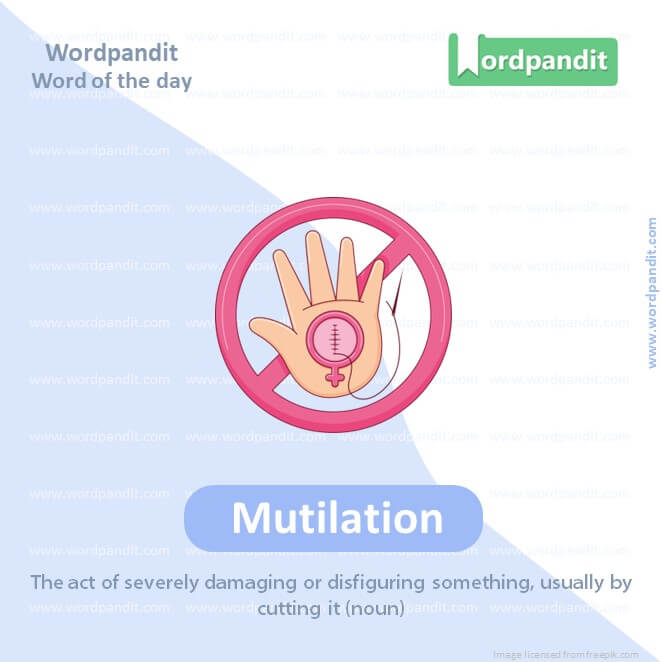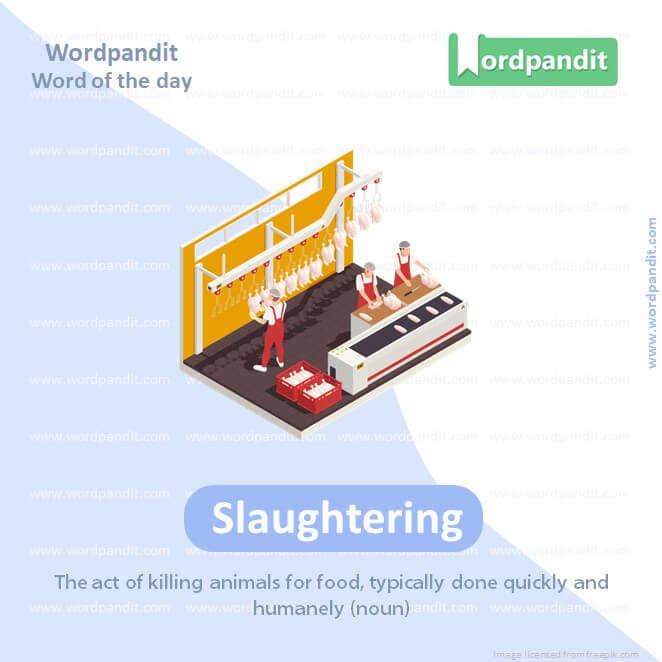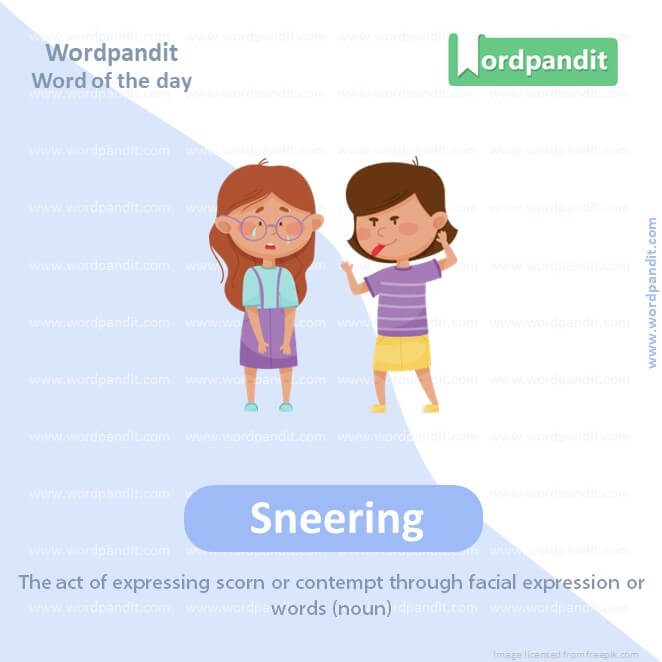Daily Vocabulary Words: List of Daily Used Words in Leading International Newspapers
Hi there. Welcome to this special section @ Wordpandit.
Our endeavour here is very simple: to highlight important daily vocabulary words, which you would come across in leading newspapers in the country. We have included the following newspapers in our selection:
• The New York Times
• The Washington Post
• Scientific American
• BBC
• The Guardian
• Psychology Today
• Wall Street Journal
• The Economist
We are putting in extensive work for developing your vocabulary. All you have got to do is be regular with this section and check out this post on a daily basis. This is your repository of words that are commonly used and essentially, we are posting a list of daily used words. Hence, this has significant practical application as it teaches you words that are used commonly in leading publications mentioned above.
Visit the website daily to learn words from leading international newspapers.

WORD-1: Mutilation
CONTEXT: There is a scene in “Screams Before Silence,” the harrowing documentary about the rape and mutilation of Israeli women on Oct. 7, that I can’t get out of my head.
SOURCE: New York times
EXPLANATORY PARAGRAPH: If you have a beautiful picture and someone cuts it up so it doesn’t look nice anymore, that’s similar to “mutilation.” It means to ruin something by cutting it or damaging it badly.
MEANING: The act of severely damaging or disfiguring something, usually by cutting it (noun).
PRONUNCIATION: MYOO-tuh-LAY-shun
SYNONYMS: disfigurement, mangling, damage, destruction, defacement
USAGE EXAMPLE:
1. The old book suffered mutilation with pages torn out.
2. He was upset to see the mutilation of his favorite poster.
3. Laws protect animals from mutilation.
4. The statue underwent restoration to repair its mutilation.

WORD-2: Drenched
CONTEXT: The sight of her pajama bottoms, drenched in blood at the back, was one of the earliest indications that sexual brutality was part of Hamas’s playbook.
SOURCE: New York times
EXPLANATORY PARAGRAPH: Think about when you play in the rain and your clothes get so wet that water drips from them. When you’re that wet, we say you are “drenched.”
MEANING: Extremely wet, soaked through with water (adjective).
PRONUNCIATION: DRENCHT
SYNONYMS: soaked, saturated, sopping, waterlogged, soggy
USAGE EXAMPLE:
1. After walking home in the storm, her coat was completely drenched.
2. He threw the drenched towel over the railing to dry.
3. The garden was drenched after the heavy rain.
4. They were drenched in sweat after the intense workout.

WORD-3: Slaughtering
CONTEXT: He’s slaughtering her,’ or something like that, and I didn’t want to look.” Cohen added, in Hebrew: “When I looked again, she was already dead, and he was still at it.
SOURCE: New York times
EXPLANATORY PARAGRAPH: “Slaughtering” is a word grown-ups use when talking about when animals are killed for meat in a way that is quick. It’s not a nice topic, but it’s important for understanding how food gets to our tables.
MEANING: The act of killing animals for food, typically done quickly and humanely (noun).
PRONUNCIATION: SLAW-tuh-ring
SYNONYMS: butchering, killing, massacre, execution, dispatch
USAGE EXAMPLE:
1. The farmer explained the process of slaughtering chickens for market.
2. Regulations ensure the humane slaughtering of livestock.
3. They visited a facility known for its efficient slaughtering techniques.
4. He learned about slaughtering in a class on agriculture.
WORD-4: Gratuitous
CONTEXT: It may also seem gratuitous. But the refusal by so many people to acknowledge what happened, often accompanied by sneering derision, makes it necessary.
SOURCE: New York times
EXPLANATORY PARAGRAPH: If you get a toy just because, not for your birthday or a holiday, we might say it’s “gratuitous.” It means getting something good without needing to do anything for it.
MEANING: Given or done freely and without necessary reason, often more than needed (adjective).
PRONUNCIATION: gruh-TOO-i-tuhs
SYNONYMS: unnecessary, unwarranted, excessive, unneeded, superfluous
USAGE EXAMPLE:
1. He offered a gratuitous comment that upset her.
2. The movie was criticized for its gratuitous violence.
3. They received some gratuitous advice that they didn’t ask for.
4. The celebration had gratuitous amounts of food and drinks.

WORD-5: Sneering
CONTEXT: the refusal by so many people to acknowledge what happened, often accompanied by sneering derision, makes it necessary.
SOURCE: New York times
EXPLANATORY PARAGRAPH: When someone looks at something or someone in a way that shows they think they are not important or good, that look is called a “sneer.” It’s not a kind or happy face but a mean one.
MEANING: The act of expressing scorn or contempt through facial expression or words (noun).
PRONUNCIATION: SNEER-ing
SYNONYMS: scoffing, mocking, derisive, scornful, disparaging
USAGE EXAMPLE:
1. He responded with a sneering remark.
2. Her sneering tone made it clear she didn’t believe him.
3. They exchanged sneering glances during the debate.
4. His speech was interrupted by sneering laughter from the audience.
WORD-6: Gratification
CONTEXT: the primary purpose of the rapes was not sexual gratification. It was humiliation and terror.
SOURCE: New York times
EXPLANATORY PARAGRAPH: When you do something really well and feel super happy about it, like when you finish a big puzzle or help someone, that happy feeling is called “gratification.” It’s feeling good because you did something good or enjoyed something a lot.
MEANING: The pleasure or satisfaction gained from an achievement or an enjoyable experience (noun).
PRONUNCIATION: grat-ih-fi-KAY-shun
SYNONYMS: satisfaction, pleasure, enjoyment, fulfillment, delight
USAGE EXAMPLE:
1. He found great gratification in helping others.
2. The gratification of a job well done is its own reward.
3. She experienced immediate gratification from her purchase.
4. They enjoyed the gratification that came from a successful performance.
WORD-7: Embodied
CONTEXT: His ethos and approach to running Tesla are embodied by his pet project, the Cybertruck.
SOURCE: New York times
EXPLANATORY PARAGRAPH: When you dress up like a superhero, you try to act and look just like them—you are “embodying” the superhero. This means you are being an example of that superhero in how you look and act.
MEANING: Represented in a clear and noticeable way; made a tangible or visible example of something (adjective).
PRONUNCIATION: em-BAH-deed
SYNONYMS: personified, represented, exemplified, incarnated, manifested
USAGE EXAMPLE:
1. She embodied kindness in every action she took.
2. The statue embodied the spirit of the city.
3. The new policy embodied the company’s commitment to sustainability.
4. He embodied the qualities of a true leader.
WORD-8: Snipping
CONTEXT: And you may want to watch your fingers with the frunk (front trunk) and doors; they don’t have industry standard sensors that can keep doors from snipping off someone’s digits. (The Cybertruck’s lead engineer said the steel doesn’t rust, and the company is working on the frunk issue.)
SOURCE: New York times
EXPLANATORY PARAGRAPH: Imagine using scissors to cut out small parts of paper to make a collage. This cutting with scissors, making little clips, is called “snipping.” It’s a way to cut things little by little.
MEANING: The act of cutting something with quick, short cuts, often with scissors (noun).
PRONUNCIATION: SNIP-ing
SYNONYMS: clipping, trimming, cutting, shearing, cropping
USAGE EXAMPLE:
1. She was busy snipping coupons from the newspaper.
2. He used a small pair of scissors for snipping the thread.
3. Snipping herbs from the garden for cooking.
4. They spent the afternoon snipping shapes for the art project.

WORD-9: Credence
CONTEXT: Tesla’s early success lent credence to this view. But recent events — and the heightened scrutiny that all public companies receive — have revealed the extent to which his ego drives the company.
SOURCE: New York times
EXPLANATORY PARAGRAPH: When you believe that what someone tells you is true, like when a friend tells you a story and you believe them, that belief is called “credence.” It means you trust and accept what they are saying.
MEANING: Belief in or acceptance of something as true (noun).
PRONUNCIATION: KREE-dens
SYNONYMS: belief, trust, faith, acceptance, confidence
USAGE EXAMPLE:
1. He gave credence to the rumor after seeing some evidence.
2. The theory has gained more credence among experts.
3. They refused to give credence to the wild claims.
4. Her explanation lacked credence with the audience.
WORD-10: Pantomiming
CONTEXT: He introduced an early prototype of the robot, called Optimus, in 2022. Videos showed it staggering around a stage and pantomiming a dance.
SOURCE: New York times
EXPLANATORY PARAGRAPH: When you pretend to pick up a heavy box or open a big door but there’s really nothing there, you’re “pantomiming.” It means you are acting out actions without using words, kind of like playing charades.
MEANING: The act of expressing or telling a story through bodily movements and expressions without speaking (noun).
PRONUNCIATION: PAN-tuh-mym-ing
SYNONYMS: miming, gesturing, acting out, portraying, expressing silently
USAGE EXAMPLE:
1. The clown entertained the crowd by pantomiming various occupations.
2. She was pantomiming the act of eating to show she was hungry.
3. During the game, he was pantomiming a famous movie scene.
4. The teacher used pantomiming to explain the story without words.
Vocabulary Hard Words
The experience of unraveling the depths of language learning often leads us to ‘vocabulary hard words’. These challenging jargons might seem daunting initially, but with the right learning strategies, the enigma of ‘vocabulary hard words’ can turn into an enticing quest. But how can these ‘vocabulary hard words’ be learned effectively?
Firstly, to master ‘vocabulary hard words’, it’s vital to break down the process into manageable steps. Instead of tackling several words at once, focus on understanding a few each day. This gradual approach ensures effective retention and understanding.
Multimedia resources tremendously aid in comprehending ‘vocabulary hard words’. Movies, podcasts, or even music in the target language contribute a comprehensive perspective. They provide real-life contexts and usages of ‘vocabulary hard words’, making them more understandable and less intimidating.
The incorporation of memory-enhancing techniques, such as flashcards or digital apps, can significantly bolster the retention of ‘vocabulary hard words’. Such tools encourage active recall, helping to cement these words into your long-term memory. Mnemonic devices can also aid in making these words more approachable by associating the hard words with relatable images or stories.
Practice is decisive when learning ‘vocabulary hard words’. Using these words in your conversations, written communications, or even social media posts will facilitate a robust understanding and recall.
Finally, do not worry about making mistakes while using ‘vocabulary hard words’. Mistakes are essential stepping stones in the learning process. They provide insights into areas that need more focus and help refine your grasp over these words.
In conclusion, grasping ‘vocabulary hard words’ is undoubtedly a challenging task but not an insurmountable one. With the aid of effective strategies including graded learning, multimedia resources, memory-enhancing tools, and regular practice, the process of mastering ‘vocabulary hard words’ can become an engaging and rewarding journey.











